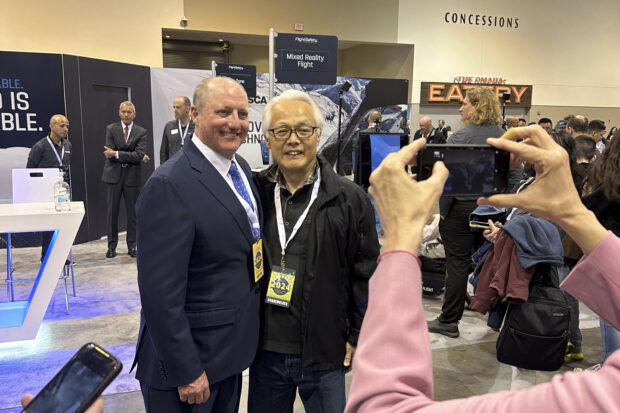
This year’s Berkshire Hathaway meeting gave shareholders their best chance yet to hear from the man who will one day take over as CEO when Warren Buffett is gone, but Buffett said for the first time Saturday that Greg Abel should also take responsibility for the company’s investments after he takes over, raising new questions about the succession plan.
Abel put his encyclopedic knowledge of the utility business that he led directly for years on display and delved into railroad operations and potential acquisitions that Berkshire pursued while sharing the stage with Buffett all day. For his part, the 93-year-old billionaire showed investors he is still sharp.
Abel pointed out that it required a major culture shift to get workers at PacifiCorp and the other utilities, who have long focused all their energy on keeping the lights on, to think about shutting the power down at times when the risk that their power lines could spark wildfires is too great. He also said BNSF railroad is working on getting “our cost structure right” after delivering disappointing results.
Succession was top of mind for many of the thousands of people who filled an Omaha arena to listen to the two men after last fall’s death of Vice Chairman Charlie Munger.
Buffett, Abel, and Ajit Jain, Berkshire’s other top executive who oversees the company’s insurers, reassured investors that Berkshire’s board spends plenty of time focused on “what would happen to the operation if I get hit by a truck,” as Jain put it. Finding the right replacement for any of the three of them will be important.
Getting timing, position size right
Previously, Buffett had said that when Abel becomes CEO, investment managers Ted Weschler and Todd Combs, who’s also taken on the responsibility of being Geico’s CEO, would handle Berkshire’s massive portfolio. But Buffett said Saturday that his thinking has evolved, and that “I would probably, knowing Greg, I would leave the capital allocation to Greg.”
And Buffett said because Abel understands businesses so well, he also understands stocks.
But Edward Jones analyst James Shanahan said a good business doesn’t always make a good stock unless you get the timing and position size right, and there is an art to that.
“I think stock picking is hard. I don’t think it’s something you can just start doing and be good at it,” Shanahan said.
Abel does have a history of making multibillion-dollar deals when he was the head of Berkshire’s utility unit for a decade, including the acquisitions of NV Energy and AltaLink, but he’s never been a stock picker. Weschler and Combs might be able to help Abel get the timing right and find opportunities in the stock market, but Buffett didn’t say that Saturday.
Abel just reassured shareholders that “the capital allocation principles that we use today will be maintained.”
“Does that give you more or less confidence post-Buffett? I would say it’s got to give you less — not because it’s a worse circumstance — but because it hasn’t been very transparent and communicated that clearly. You’ve got to start asking, well, what else is going to change?” said Cole Smead with Smead Capital Management.
Abel definitely has the confidence of the CEOs at all of Berkshire’s many varied noninsurance businesses who report to him and ask his advice on any challenges they are facing.
“Greg sees so much more than I do on a daily basis. So his perspective is valued, and his wisdom is something that is such a luxury for all of us to be able to tap into,” said Dan Sheridan, who just became CEO of Brooks Running this year after his predecessor retired. He said Abel is always humble and curious about the business, even while asking challenging questions.
See’s Candies CEO Pat Egan added that Abel reflects all of Berkshire’s core values, with the company’s emphasis on integrity, taking care of customers, and strengthening brands, while still giving Berkshire’s subsidiaries the freedom to operate independently.
Meaningful boost to earnings
“He really expects us to know our business, understand the parameters, and to run our business on a day to day basis,” said Tim Baucom, CEO of flooring giant Shaw Industries. “So I feel like I have all the freedom of the world, but with freedom comes responsibility.”
The shareholders who attended the meeting and spent hours shopping and talking with executives at the booths Berkshire subsidiaries set up when they weren’t listening to Buffett and Abel remain confident. Some of them even got the chance to take selfies with Abel, though Buffett no longer tours the exhibit hall in public.
“I think they’ll be fine,” said Michael Grizzard, who made the trip to Omaha from Richmond, Virginia, for the second time. “They’re in good hands, and I think they have a good culture.”
Smead said even Buffett, who is easily one of the greatest investors the world has ever seen, has been having a hard time lately finding good investments big enough to make a difference at Berkshire except for the $135 billion Apple stake that remains its largest investment even after some trimming this year.
So no matter how good an investor Abel is, he will have a hard time finding deals big enough to provide a meaningful boost to Berkshire’s earnings that approached $13 billion in a down first quarter. That challenge is a big part of why Buffett has warned investors not to expect any of the “eye-popping performance” of Berkshire’s past.
But for now, Buffett showed that Abel may not need to take over anytime soon because he looked good and he has long said he has no plans to retire, even if he acknowledged Saturday that he doesn’t have the same energy he used to. CFRA Research analyst Cathy Seifert came away impressed with his stamina.
“There wasn’t anything in that performance that I found worrisome or troubling,” Seifert said.

